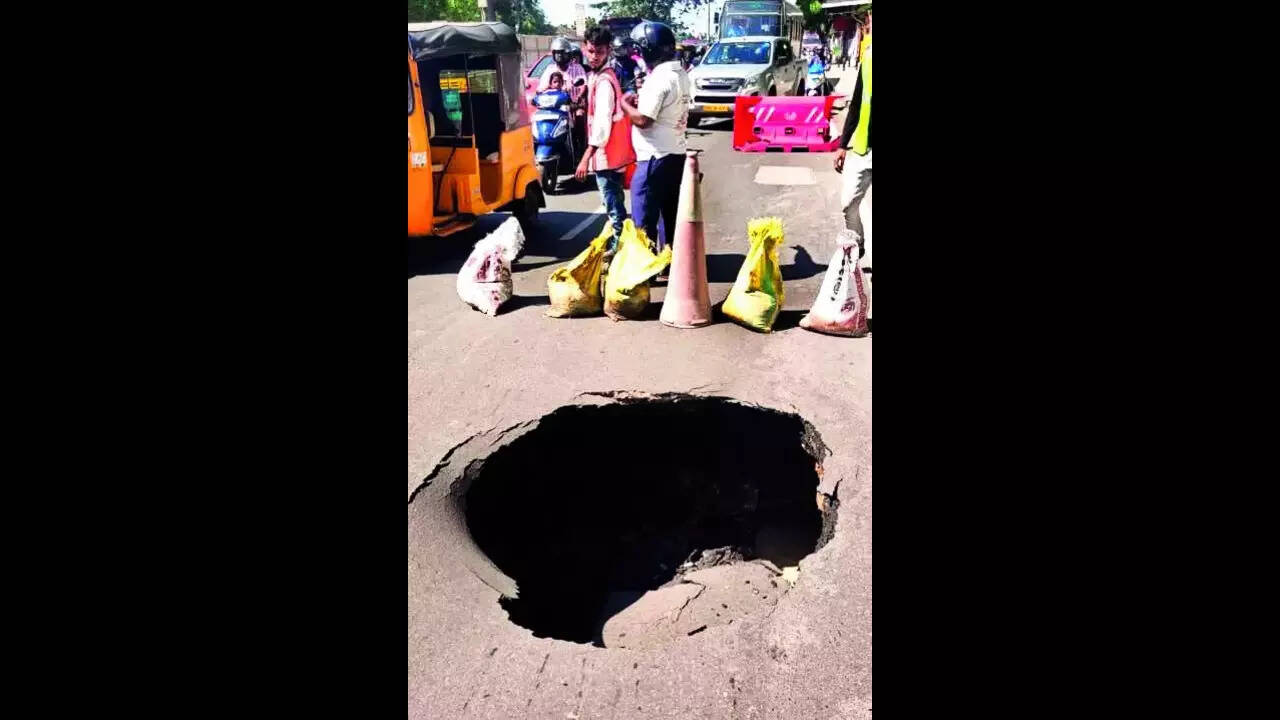[ad_1]
CHENNAI: Metrowater has appointed a consultant to study existing water and sewer pipelines that are at least three decades old in core Greater Chennai Corporation areas.
There are 4,149km of sewer lines in city and 5,600km of water pipelines.
“We will get the detailed project report by December about the status of the pipelines. Then, the next steps to improve the existing infrastructure will be decided,” said Metrowater managing director R Kirlosh Kumar.
Every day, there are multiple complaints of sewer and water pipeline leaks and overflow in the city. “An underground pipeline is bound to leak if it has been laid three decades ago,” said E Srinivasan, region secretary of Tamil Nadu Civil Engineers Association.
When there are leaks, sewage or water can overflow on the road. Otherwise, it will leak onto the ground. “Gradually, the sand inside the ground will get wet. The volume of the sand will then compress, creating a vacuum. When there is enough vacuum, the road will cave in due to gravity,” said Srinivasan.
On Thursday, Dr Nair Road in T Nagar caved in due to a sewer pipe leak, and the pit was 10-foot-deep and 7-foot-wide. This month, Adyar and Nanganallur roads also caved in due to the same reason.
Stormwater drain work and Metrorail construction have also damaged water and sewage pipelines across the city.
“The study will help us understand where we should repair or replace pipelines,” said the managing director. “The report will have details on the strength of the pipe and the locations of the leaks.” The detailed project report will also suggest which of the old pipes must be replaced, where supplementary pipes must be provided, where water pressure can be increased.
The water board has also mapped its underground infrastructure and other buildings such as sewage pumping stations in the core city using geographical information system, where leaks can be identified using real-time monitoring data. By the end of October, a GIS cell will be set up in the Metrowater head office.
“Currently, we have a database of 512 hotspots of sewage and water overflow, that were recorded during the 2022 northeast monsoon. We are desilting and looking for leaks in those spots,” said Kirlosh Kumar.
There are 4,149km of sewer lines in city and 5,600km of water pipelines.
“We will get the detailed project report by December about the status of the pipelines. Then, the next steps to improve the existing infrastructure will be decided,” said Metrowater managing director R Kirlosh Kumar.
Every day, there are multiple complaints of sewer and water pipeline leaks and overflow in the city. “An underground pipeline is bound to leak if it has been laid three decades ago,” said E Srinivasan, region secretary of Tamil Nadu Civil Engineers Association.
When there are leaks, sewage or water can overflow on the road. Otherwise, it will leak onto the ground. “Gradually, the sand inside the ground will get wet. The volume of the sand will then compress, creating a vacuum. When there is enough vacuum, the road will cave in due to gravity,” said Srinivasan.
On Thursday, Dr Nair Road in T Nagar caved in due to a sewer pipe leak, and the pit was 10-foot-deep and 7-foot-wide. This month, Adyar and Nanganallur roads also caved in due to the same reason.
Stormwater drain work and Metrorail construction have also damaged water and sewage pipelines across the city.
“The study will help us understand where we should repair or replace pipelines,” said the managing director. “The report will have details on the strength of the pipe and the locations of the leaks.” The detailed project report will also suggest which of the old pipes must be replaced, where supplementary pipes must be provided, where water pressure can be increased.
The water board has also mapped its underground infrastructure and other buildings such as sewage pumping stations in the core city using geographical information system, where leaks can be identified using real-time monitoring data. By the end of October, a GIS cell will be set up in the Metrowater head office.
“Currently, we have a database of 512 hotspots of sewage and water overflow, that were recorded during the 2022 northeast monsoon. We are desilting and looking for leaks in those spots,” said Kirlosh Kumar.
[ad_2]
Source link






Join The Discussion